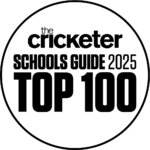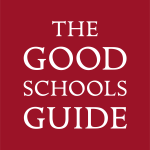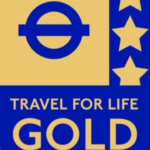Tony Boddy Emanuel and Sporting Memoirs: The OE rugby legend who faced Australia, South Africa and the All Blacks (twice)
Over the first lockdown we were delighted to track down Tony Boddy (OE1959-65) who is one of Emanuel’s greatest ever sportsmen. In the days of amateur sport Tony balanced a busy career in the Metropolitan Police Force with an incredibly successful career as a top class rugby player. Tony played for many teams, including The Met, London Counties and Middlesex. He twice played against the New Zealand All Blacks, as well as other top countries such as Australia and South Africa, the latter of which he toured with England in 1971.
What do you remember about your early days at Emanuel?
Having passed the interviews and asked to join the school my Dad was very impressed, but not with the clothing demands! The jacket and trousers, plus some sports wear could only be bought at Harrods… not the cheapest of places. I remember it did not take me long to ruin a pair of trousers, getting a strong rebuke plus a warning concerning the future!
You entered the school grounds and walked the long drive into the playground. At the start of the drive you passed the cottage occupied by the Serjeant and his wife (a man responsible for much going on in the school and who later took charge of the tuck shop with his wife). Also, by the entrance were often found boys taking names and numbers of trains running along the track which runs alongside the drive.
You soon found out that life at the school was strict with solid rules and punishments for transgressing. When at school you had to wear correct dress and also when travelling, the cap.
How did you get involved in rugby?
Having been introduced to the game at the school it obviously went on to have a great influence in my life. My Dad, who always supported both my brother Barry and I in all our sports, was also a great help. When we were younger he used to walk us over Putney Common to Roehampton to watch Rosslyn Park play and he was the only father taking all the kids in the street for various games in the park.
How do you remember sport at the school?
Sports afternoon for the first years was on Monday afternoon, went to Thursday afternoon for second, third and I think fourth years and then Wednesday for the fifth and sixth years. I love all sport and would willingly try my hand at anything and the school excelled in its approach and encouragement for sport. The facilities all round were excellent.
My early sport afternoons were taken by Mr May (sports teacher) who took the rugby session. It was basically an introduction to the ball, some rules and a general feel for the game. The master lined us up in two lines and said he would throw the ball in for a lineout and we should try and catch it. I remember quickly getting the hang of it and won most of the ball by simply pushing everyone else out of the way. Next we were into tackling and I was given the ball and someone was told to tackle me, but I managed to avoid him and so the ball went to someone else and was told to tackle them. This I duly did with a correct dive at their legs, which as I look back, was a great surprise as it was not my strongest discipline. I have got to say that as long as Mr May was at the school he actively encouraged me in playing rugby and I feel he was one of the reasons I both enjoyed and excelled at it.
The school, by having its own fields, allowed us to play rugby in the winter and cricket in the summer. There was also tennis, athletics and near the end of my time the fives courts were built. The fields at Blagdons could be used and the school provided a ticket for the train journey.
I was lucky to play both rugby and cricket for all ages for the school which meant giving up Saturdays as well as Wednesday afternoons; a chore I relished. I now have complete admiration for the Masters who controlled the teams. Mr Craddock (known as ‘Joe’) did both sports, a man who was always obeyed, and was fluent in many languages. One of the later Masters was John Tusker who played for London Welsh and was a PE teacher at the school. He introduced me to more advanced play.
The Combined Cadet Force (CCF) was incredibly popular during your era. Were you involved?
Once past the first two years, you were into the Combined Cadet Corps which paraded on a Tuesday afternoon where marching and squad parades were often practiced. We were also introduced to rifles but with no ammunition. For the first two years, boys were in the Army Cadets but after that could apply to join the Navy or Air Force Cadets. I was accepted into the Navy and remember having a week in Portsmouth at a Navel Base enjoying the delights of rope courses, boats and, best of all, playing Deck Hockey against the other recruits. It is a game that can be played on a ship as it’s no ball; just a quoit and a certain amount of physicality is allowed.
How did you end up in the police force?
I remained at the school until 1965 when after test, interviews and medicals, I was invited to join the Metropolitan Police Cadets. I did three phases in the Cadets and eventually joined the force in March 1967 when I was 19. Mum and Dad moved to Cornwall in 1966 and there was some thought of me joining the police there, but I declined, wanting to stay in London. A good reason for this was perhaps the fact that I met the lady who was to become my wife, Pat, (and I better add still is!). We had two children, a boy in 1972 (Steven) and a girl in 1974 (Amanda). I served in the force for 30 years, and then in 1997 retired on a full pension.
Could you tell us more about your time in the police?
I joined the Met Police Cadets in 1965 and served two terms at Hendon Training School learning the arts of fitness. They introduced us to rope courses, log runs, judo, wrestling, boxing, swimming and many other things. In March 1967 when I turned 19 I went back to Hendon for the introductory course to become a Police Officer. I completed the course and then was posted back to City Road to serve.
I was taught and subsequently drove motorbikes (called ‘Noddy’ bikes in those days) and ordinary cars and vans. Sitting in a car travelling at speed with sirens and lights going was very exciting! I transferred to Harlesden Police Station in 1971 and then to Harrow Police Station in 1975. For all this time I served mainly as a normal beat officer. I was also asked and subsequently did become one of the first users and trainers for riot shields in riot situations. In 1980 I took the test to join a special CID group and was employed there until 1982. Then I applied and was successful in joining Met Training at Hendon as a Physical Training Instructor, where I stayed until I retired in 1997.
If you could highlight any special memories from your school days, what would they be?
I appeared in a shortened version of A Midsummer’s Night Dream playing ‘Snout’ in the Hampden Hall in front of many parents, pupils and staff. I remember learning my lines and then keeping quiet when not on stage. All these years later I still remember my line “snout by name who presents a wall” which is amazing in that I couldn’t remember any Latin or French translations. Such was my lot in life!
Almost famously, a group of boys in my brother’s year (‘The Thyrds’) appeared in one of the first television talent shows. They got to the final but did not win. They also made a 7-inch single record but then broke up and went to university.
What were your career rugby highlights?
In 1970 I went to Met Police Rugby trials and won selection. I played for the 1st team and the same season got a call from Middlesex County to play for them. In 1971 I continued playing for Met Police, Middlesex and then was called up for England Trials.
I was successful and became substitute hooker for England, with John Pullin the captain as the first choice (in those days there were only six subs for internationals and replacement for injury only). I watched from the side-lines as we lost to Ireland, Wales, Scotland and France. A stand-in hooker is a good way of describing what is a very frustrating feeling. John was a great hooker and captain but if you have ambition you always think you are better. It was hard, but now I look back it was great just to have been there.
After the end of season in 1972 we went to South Africa where, to the amazement of all, England won seven out of seven games including the test. Later in the same year, I played for London Counties against New Zealand and returned to South Africa in 1973 with the London Counties and Middlesex in 1979. In 1975 I played against Australia for the Home Counties and against New Zealand for the second time in 1979.
On a lesser note I do remember playing in the Middlesex Sevens at Twickenham and the crowd was its usual noisy but funny self. The Met Police were playing London Welsh and both teams were the least of the favourite to them all. We ran out and the crowd booed and we were followed by London Welsh John Dawes et al and the crowd booed even louder. My day got better as halfway through the first half JPR Williams had the ball facing me and of course realised he was quicker, so hacked the ball well past me and proceeded to follow it. Quick as a flash he tried to follow the ball and I turned in front of him taking him down. I was going to lose the race, I decided a telling off was the better option!
Did you ever suffer from any serious injuries?
Having badly injured my knee in playing for Middlesex County against Sussex I was out of rugby for a while in the 1970s, so I went to Richmond RFC to try and regain my fitness levels. Eventually I returned to the Met Police where I captained the side for five years before retiring and going on to coach them and Middlesex.
How did you find balancing a full-time job and top level sport?
Balancing a full-time job and playing top sport is both hard and rewarding. The police force at the time was excellent in its understanding and commitment but odd people sometimes turn up as in all professions to make life difficult. You also need a very good and understanding partner (my wife), which I did and still do.
You played in the famous England tour of South Africa in 1971?
Yes. I played the three games for England in South Africa and two were against predominately black sides in a time when Apartheid was still being practiced. It was strange times and the facilities were a bit basic but everyone was very welcoming. Mind you, when we won the test for the last game the South African team did not turn up for the presentation and John Pullin made a great speech ending with “We might not have been a great team losing our home games but we always turned up”.
You also played against the New Zealand All Blacks twice. What do you remember?
To lose any game is hard and its not something I was good at, but the All Blacks were good and very forceful in approach and management. A few things best forgotten were handed out.
You returned to rugby after you retired from the police?
When I left the police I joined Harlequins for a short time, but Andy Keast, Director of Rugby, got the sack at the end of the season and as he employed me I left as well. In 2004 I went up to Worcester to be their Team Manager as they had just been promoted, so it was a learning curve for all parties. As seems to happen with all sporting clubs people get the sack or move on and so it was there. John Brain went after three years and someone new came in. John and I got on really well but the new people were different so I retired and called an end to working life.
You must have locked horns with ‘Big’ Alan Friell who coached rugby at Emanuel for 20 years and played for Scotland ‘B’ and other clubs?
Yes. I played against him when he played for London Scottish (club level) but also played alongside him for both Middlesex (country level) and London Counties (divisional level).
What do you think of the move towards professionalism in rugby?
Life in rugby is so different now; same shaped ball and pitch, but things will only keep changing. The thought of professional rugby many years ago was a dream, but as I sit back I am glad I was not given the option. The police force helped me with special leave for the big games so I was affectively paid for playing certain games and training periods. I now sit here with my pension, very sore and limited use knee, as well as an aching back, but with great memories and an interesting life.
When I first sat on the bench for England you were given one pair of socks for the season. You had to supply your own shorts, you had to provide all your own tracksuit or warm clothing and you had to give your shirt back after the game, but to be there with a full Twickenham is something which is hard to explain and impossible to forget.
Can you sum up your amazing life in sport?
I came to the conclusion many years ago that ‘book-work’ held second place for me to the sporting world. That’s always a good excuse for being lazy but in my case that is not quite true. Apart from rugby, which is well documented, I have played cricket, athletics, volleyball, basketball, amateur wrestling, judo, boxing, lawn bowls, tennis and have run the London Marathon (1985) plus many half marathons and at present try to play golf. When I was younger I was in the scout movement and had the honour of gaining the ‘Queen’s Scout’. My life has been made complete by a very understanding and tolerant wife who has given me two wonderful children; a son who is in the Hertfordshire Police and a daughter who is in the Metropolitan Police.
Interviewed by Tony Jones (Senior Librarian & Archivist)













